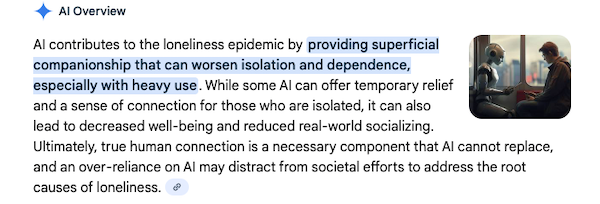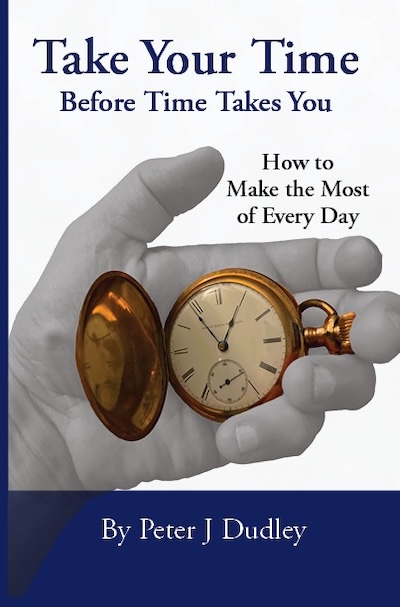No, I will not make a chatbot of myself
Today I was told that I needed to create an AI chatbot of myself, or I will become irrelevant in the very near future.
The benefit to my clients, apparently, would be that they would get more of me by getting none of me.
Count me out of this race to the bottom. I’m in coaching because I love working with my clients, not so I can give them a new vending machine for easily obtained common knowledge. Plus, I don’t want to contribute to the growing loneliness epidemic.
There’s a lot of hope that AI might provide a solution to the loneliness epidemic. Individually and in some use cases that may pan out, but I believe that at scale the opposite will happen.

Over the weekend I read an article in NY Times Magazine (sorry, paywall) about people who fall in love with AI chatbots. The most fascinating thing to me in the article was the way that these people could both feel the emotions of connection while holding the knowledge that there was no actual entity behind the chatbot.
AI will make loneliness worse, not better
We as a society have an infatuation with AI. But AI will ultimately let us down, in the way someone can feel lonelier in the presence of an inattentive partner than they do when they are actually alone.
I have this belief due to three things I think are true:
1. No, the chatbot does not actually get you
The people in the NYT article felt seen in a way no human partner had made them feel seen before. This is not a superpower of chatbots; it’s a failing of humans in basic interpersonal relations. We don’t really listen to each other most of the time.
It’s also a misunderstanding of what the chatbot is doing. It is not listening, relating, and understanding. It is simply guessing at a proper response. Most often, this will be some set of words that affirm the human’s existing worldview.

Great coaching, however, is not about affirming the client’s worldview. It’s not about validating the client’s fantasies and giving answers the client’s subconscious wants. Those things don’t create change that leads to happiness or fulfillment or success; they merely give a sense of validation. This is also what coaches with limited life experience or lesser skill set do; even though it might feel like they’re being insightful, their client never really achieves the changes they’re seeking.
Great coaching lives in the realm of truth and reality. It’s easy to validate a client’s feelings, thoughts, biases, and worldview. But it’s not useful. Clients come to me because they want change, and true change is hard.
2. A chatbot has no stories of its own
Time and again I’m reminded that the most powerful thing in the world is a story. Clients have stories. I have stories. Stories are how we relate to each other. Stories are how we teach and learn.
Chatbots can tell stories, but they have no stories of their own. No chatbot has ever laughed after their friend spilled red wine on their white cat. No chatbot has ever gotten lost on a hike. No chatbot has ever had to change a flat tire on an icy hillside in the dark. No chatbot has ever had tea while gazing at the Annapurna Range.

It’s true that a chatbot has access to a million times more stories than I do. It can even synthesize new stories from the many it consumes. But it cannot have stories of its own, and that will always leave a subtle but important hole in the exchange which will feel empty. If it’s not loneliness, then it’s loneliness-adjacent.
3. A chatbot cannot die
A chatbot cannot give birth. A chatbot cannot die. A chatbot cannot be laid off, get diagnosed with a terminal disease, suffer a career-ending injury, parent a suicidal teen, overcome addiction, retire after a long career, or have any other profoundly human experience. (For the record, I am aware I also cannot give birth, but you get my point.)
A chatbot can predict what someone who has gone through those things might say, but that is a lot different from hearing the words from a human who has experienced it. Even if I have not had your experience, I likely have had an extremely relevant, adjacent experience. A chatbot has no experience at all.
A chatbot does not even truly exist in the sense of having a manifestation and a beginning and an ending. No chatbot will ever have to come to terms with its own mortality. No chatbot will ever have to decide what it wants to do with its limited lifetime.

But it feels human!
Yes, yes, you may be saying, but what does all that matter if I get the same feelings I get when I’m interacting with another human? Aren’t you just trying to defend your job, Peter? Haven’t you heard the fable of the buggy whip manufacturer? Modernize or die!
Well, for one thing, AI gets simple things wrong all the time.

So there’s that risk. Of course, humans also get things wrong.
So, the question is relevant. People have fallen in love with and married prison inmates without ever meeting in person. In a world of global instant communication, real people may become best friends over just text messages.
No one really knows, so do what you believe is right
The real truth is no one knows what will happen or how things will go. We are all participants in a terrifying, non-consensual experiment. We all have biases and beliefs about it, but no one actually knows.
I just know in my heart that making a chatbot of myself would be to accept that being human means nothing, and that interacting with other humans has no inherent value.
Either that, or I’d be accepting that I’m willing to give some of my clients a lesser experience for the sake of… what, exactly?
If my client wants a lesser experience, they are welcome to hire a different coach.
Connect with me
Schedule a consultation session now or drop me a line.

With Take Your Time Before Time Takes You, learn to make the most of every day through thought-provoking exercises and perspective-twisting stories. Get it now in paperback or ebook.
“It changed my life.” – TP, client
“A go-to guide for people who want to improve their lives but don’t know where to start.” – MJ, earlier reviewer

RELIT: How to Rekindle Yourself in the Darkness of Compassion Fatigue gives practical, actionable advice on avoiding and overcoming compassion fatigue and caregiver burnout. My chapter explains how I stay centered and focused so I can give every client my best, every time.
Download my chapter for free: Show up. Try hard. Be nice.
Or just go buy the whole book. It’s worth it.


